Blog
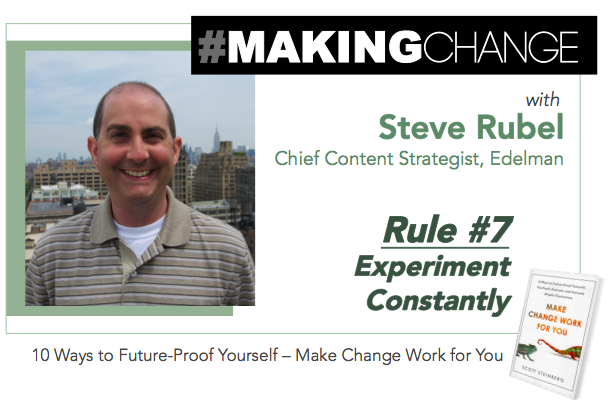
#MakingChange with Steve Rubel – Rule #7 Experiment Constantly
Finding the courage to embrace change and take chances is the only way to succeed. We’ve asked some of our favorite industry power players and business innovators to share stories of how #MakingChange worked for them, as it relates to the ’10 Rules to Future-Proof yourself, fearlessly innovate, and succeed despite uncertainty’. Rule #7 Experiment Constantly with Steve Rubel – Chief Content Strategist, Edelman Question: How did you get where you are today – and what tips would you give others hoping to follow in your footsteps? Steve Rubel: As Edelman’s Chief Content Strategist I am charged with studying how digital content flows from the people who create it to the people who ultimately will consume it and how this impacts how companies must now communicate. Edelman is the world’s largest public relations firm, with more than 5,000 employees in 65 cities, as well as affiliates in more than 35 cities. My role is to help all of our employees and our clients connect the dots in new ways that ensure they will be heard. I have been in the public relations field for 20 years. I joined Edelman in 2006 to help accelerate the firm’s embrace of social media as a new way for our clients to engage their various stakeholders. (In my prior role at another firm I launched some of the earliest social media programs in PR.) For the last three years I have been focusing on how our clients can embrace systems thinking to connect paid, earned and owned content programs into a memorable constellation. I would advise others who want to do the same to...
read more![Interview: STEVE MYERS [Business Innovator]](http://makechangeworkforyou.com/wp-content/uploads/Steve-Myers-Make-Change-1080x675.jpg)
Interview: STEVE MYERS [Business Innovator]
BUSINESS INNOVATOR Steve Myers – Chief Technology Officer, Optum Specialty Networks Question: How do you and your organization adapt to fast-changing times and trends? Steve Myers: Personally, I take the approach of trying to listen to key market players, folks introducing new disruptive technologies or business processes, and staying informed to market trends. I apply the knowledge to look at opportunities and solutions for ideas that mix our culture, mission, and vision, and would better prepare our business for the future. Organizationally we do similar processes globally, and work to solidify the foundations of our core business – constantly looking for improvements and business innovation that will give both incremental positive change but afford us the opportunity to gain significant market share through internal and external development of those ideas. Q: What’s the best way to innovate and stay ahead of the curve? SM: I try not to focus on today; it is almost over. I look at the future with our consumers – what their future needs are – through actively listening, watching and monitoring the market, and by planning for future action that has both short term and long term effects. Innovation cannot be accomplished without creating a culture of change within the organization, that is monitored and guided for positive movement forward. Couple these things with your vision and a plan, and you will be successful. Q: The trick to getting ahead in an increasingly uncertain world is…? SM: Actively listen and hear the world around you, then adapt, act and lead in a way that supports your journey in life. Always do the right thing,...
read more
Where are you #MakingChange?
We recently asked the twitter-verse to show us where they are #MakingChange, and the breadth of results were fantastic! From fashion, to music, to non-profits changing the world, here’s a glimpse at some of our favorite spaces shared. 1) Designer Chelsea Sheridan in the lobby of Seattle’s W Hotel. #MakingChange knows no (travel) bounds. Twitter: @chel_sher 2) Art History PhD student at Brynn Mawr, Lola Arellano-Fryer shows us her desk-side charm cheerleader & #MakingChange motivator. Twitter: @runlolarun 3) There’s no place like #MakingChange at home for pop-culture writer Regina Lizik (and what a beautiful home it is!). Twitter: @ScarletRegina 4) Orange is the new #MakingChange at Percolate – as seen on Taisa Veras’s desk. Twitter: @Taisa_Veras 5) Tammy Tibbetts is #MakingChange for herself and others at She’s the First HQ – as a non-profit adopted by NextJump. Double the change! Twitter: @TammyTibbetts 6) Music to our ears – Theo Aronson of La Ooh La La Records is literally #MakingChange to songs, remixing at his favorite studio. Twitter: @TheoAronson 7) Moda Box is #MakingChange in the way people find and try fashion – from their offices to your home. Twitter: @myModaBox 8) Arielle Shipper, Content Strategist at dining payment app Cover, reminds us that the key to #MakingChange is fueling our bodies. Twitter: @ArielleShipper Use the hashtag #MakingChange to share your stories or photos with us and find them on makechangeworkforyou.com/blog, along with inspiring interviews from industry...
read more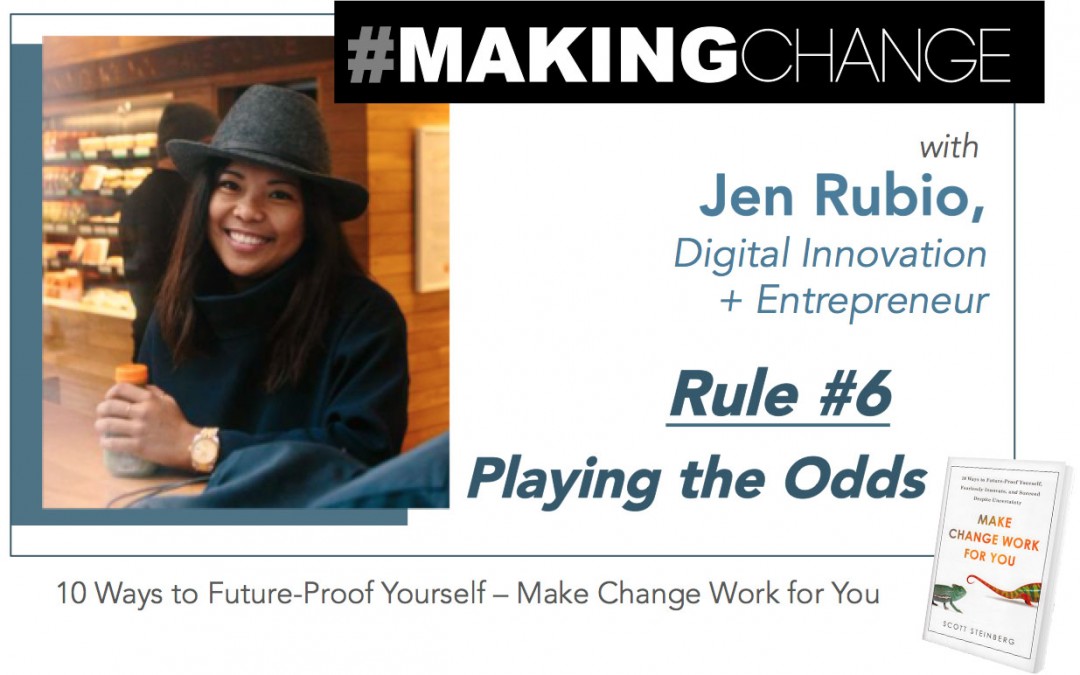
#MakingChange with Jen Rubio – Rule #6 Playing the Odds
Finding the courage to embrace change and take chances is the only way to succeed. We’ve asked some of our favorite industry power players and business innovators to share stories of how #MakingChange worked for them, as it relates to the ’10 Rules to Future-Proof Yourself, Fearlessly Innovate, and Succeed Despite Uncertainty’. Rule #6: Playing the Odds – with Jen Rubio, Digital Innovation + Entrepreneur Question: How did you get where you are today – and what tips would you give others hoping to follow in your footsteps? Jen Rubio: I started out as an analyst at a massive company, Johnson & Johnson, and became passionate about social media in my personal life. I decided to channel that passion into my job, and eventually left corporate life to become a social media consultant. At the time, very few people even knew what that meant. I wound up with some big-name clients and worked on the agency-side, before moving to Warby Parker. After some incredible years at Warby Parker working on social media and marketing, I moved to London to build a global digital innovation team for AllSaints, a fashion retailer. My advice? Don’t accept the idea that you’re set in a certain path. With each move in my career, I followed what I was good at, combined with what I was passionate about. It made for a completely untraditional career path with very natural progressions. Now, I’m starting my own company, which has been a longtime dream of mine. Q: What does being courageous in life and business mean to you? JR: Being courageous is a matter of dealing with things with...
read more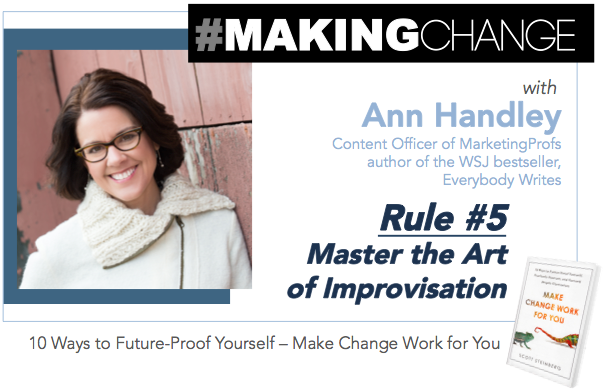
#MakingChange with Ann Handley – Rule #5 Master the Art of Improvisation
Finding the courage to embrace change and take chances is the only way to succeed. We’ve asked some of our favorite industry power players and business innovators to share stories of how #MakingChange worked for them, as it relates to the ’10 Rules to Future-Proof yourself, fearlessly innovate, and succeed despite uncertainty’. Rule #5 Master the Art of Improvisation with Ann Handley – Chief Content Officer of MarketingProfs and the author of the WSJ bestseller, Everybody Writes Question: What’s your background? How did you get where you are today, and what tips would you give others hoping to follow in your footsteps? Ann Handley: When I was 8 years old, I wrote in my diary that I wanted to be a “writter.” Eventually I learned to spell the word, and I became a writer, journalist, editor and (when the internet happened), a content publisher. I worked at newspapers, magazines, and became the first Chief Content Officer at ClickZ (a company I founded in 1997). I now hold the same title at MarketingProfs. I write for fun at AnnHandley.com, and I speak all over the world. I’ve always relentlessly focused on my audience. I try to make whatever I write or speak about a little clearer and more accessible to the people in the audience. I still do that now. In other words, focusing on others is a key to your own success. Ironic, perhaps. But true. Q: What does being courageous in life and business mean to you? What are some of the biggest concerns and fears you’ve faced and how have you overcome them? AH: Wow. How much time do we have? I was a...
read more![Interview: CALVIN SMITH [Business Innovator]](http://makechangeworkforyou.com/wp-content/uploads/Calvin-Smith-Business-Innovator-1080x675.jpg)
Interview: CALVIN SMITH [Business Innovator]
BUSINESS INNOVATOR Calvin Smith – Principal Manager, Global Innovation, EMC Question: How do you and your organization adapt to fast-changing times and trends? Calvin Smith: Things are constantly changing and evolving today, and nowhere is this more true than in our industry (IT). Moore’s Law was actually created to describe how the best way to adapt is to continuously keep your finger on the pulse of trends. By casting wide nets, both internally (employee ideas across our 66,000 person federation of companies), and externally (academia, startups, our enormous customer/partner ecosystem), we’re able to canvas each environment and build educated predictions of “where things are going,” and then mobilize in advance of trends occurring. Q: What’s one simple change an individual or business can make to achieve success today? CS: I firmly believe in the importance of tapping your company’s greatest resource: it’s employees. Many organizations–both large and small–hire someone to fill a specific role, then ask that individual to take a somewhat myopic approach to their work. We say, “That’s not your job” or “focus on the task at hand” — that’s a very tactical approach to problems. It doesn’t empower the employee to think strategically about the company’s “greater purpose.” If your company is publicly traded, in addition to their “day jobs,” it should be the objective of every employee to increase shareholder value. A company, like anything, is the sum of its parts, and the human capital is the most important “part.” If you have a complex problem to solve, you might be surprised by the kind of responses you would get, if you ask all of your employees for help in solving it. Q: What’s the...
read more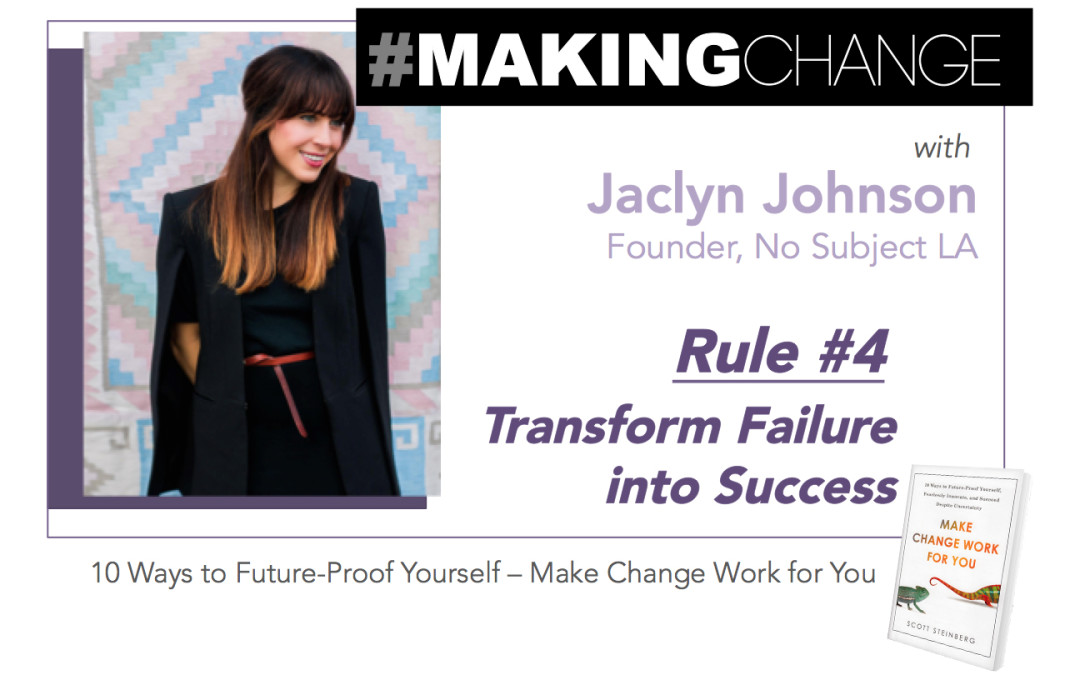
#MakingChange with Jaclyn Johnson – Rule #4 Transform Failure into Success
Finding the courage to embrace change and take chances is the only way to succeed. We’ve asked some of our favorite industry power players and business innovators to share stories of how #MakingChange worked for them, as it relates to the ’10 Rules to Future-Proof yourself, Fearlessly Innovate, and Succeed Despite Uncertainty’. Rule #4: Transform Failure into Success – with Jaclyn Johnson, Founder of No Subject / Create + Cultivate Question: Give us a look into your professional background- how did you get to where you are today? Jaclyn Johnson: I studied magazine production at NYU and interned at Condé Nast throughout college. I took my first job at Time Inc Interactive, at a think tank tasked with strategizing the relationship between print publications and online (this was a while ago). From there, I took a job at an agency called ATTENTION, which at the time, was pioneering some of the first social media marketing and word-of-mouth campaigns. There, I worked with brands like Bluefly, M.A.C. cosmetics, and Hugo Boss, creating buzz-worthy online campaigns focused on social media platforms and influencer engagement. I later joined iCrossing to develop and head up their social media service lines for clients like CVS, Mazda, and Avery Dennison. Following that, I went in-house at Interactive Corporation, where I consulted on their online properties, Pronto and Citysearch. It later brought me to Los Angeles, and I started my own agency, No Subject a little over 5 years ago! Q: What does being courageous in life and business mean to you? What are some of the biggest fears you’ve faced, and how have you overcome them? JJ: Being an entrepreneur requires a lot of courage— mostly against the risk...
read more![Interview: BRANDON BARNETT [Business Innovator]](http://makechangeworkforyou.com/wp-content/uploads/Brandon-Barnett-Business-Innovator-1080x675.jpg)
Interview: BRANDON BARNETT [Business Innovator]
BUSINESS INNOVATOR Brandon Barnett – Director of Business Innovation, Intel Q: As the Director of Business Innovation at Intel, how do you adapt and stay relevant? Brandon Barnett: The first step is understanding complex system dynamics, and how your organization adapts. This goes beyond simply tracking linear trends. As a team, we study social, cultural, economic, and technological forces behind emerging markets. We see markets as an ordered network that emerges from a complex adaptive system, with a large number of components that interact and adapt to each other, that isn’t easy to predict with an isolated understanding of the components. This view means we focus less on trends, and more on transformations–the instabilities and discontinuities in a market. For example, as music has become digitized, the idea of ‘ownership’ has changed. I no longer own my music in the same way I did, because it can now be shared without limits. This isn’t really a trend, it’s a social and economic shift in the music industry that’s transformed our value network and business models. While we might not know what new system will emerge next, we can usually detect signals that the current one will radically change. Q: What’s your advice for getting ahead in an increasingly uncertain world? BB: Embrace uncertainty. Put more accurately, embrace complexity. Companies to expend great effort, time, and treasure, to try to gather data and model scenarios to help mitigate uncertainty. But it only works if the market is quantifiable and competition is known. In today’s internet economy, platforms are established much more quickly than in the past, so it’s a risky strategy to simply watch and wait, and hope to be a ‘fast follower’. The key is to have programs that give real-time feedback about market...
read more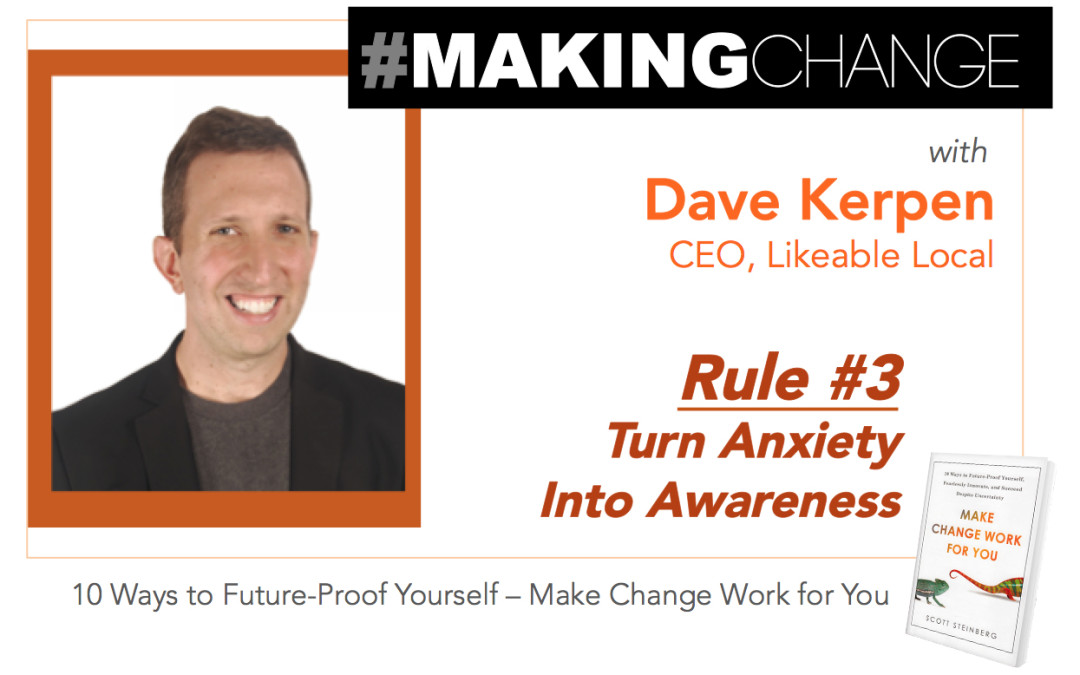
#Making Change with Dave Kerpen – Rule #3 Turn Anxiety into Awareness
Finding the courage to embrace change and take chances is the only way to succeed. We’ve asked some of our favorite industry power players and business innovators to share stories of how #MakingChange worked for them, as it relates to the ’10 Rules to Future-Proof yourself, Fearlessly Innovate, and Succeed Despite Uncertainty,’ rolling out one new rule each week. Dave Kerpen, CEO of Likeable Local Question: How did you get where you are today? Dave Kerpen: The story of my first company is pretty unique. We got married and started a company at the same time; we ended up getting our wedding sponsored and paid for—to the tune of $100,000 in sponsorships and $20,000 for charity. It was a great day because I married to the love of my life, but also turned out to be an incredibly successful marketing event for our business. At first, we were worried about getting married in such a public and unorthodox fashion, but we were able to move beyond that fear. I’m very happy we did. Q: On the topic of fear, do you think there’s always a certain amount of discomfort when you attempt something big? DK: Courage is perseverance in the face of fear. Recently, I was teaching a lesson on courage for my daughter’s Girl Scout troop, and I told this story of a girl who witnessed another girl getting picked on, and how she stood up to the bully. I asked everyone to tell me what courage meant to them, and one girl said, “It’s doing the right thing.” Then, my daughter said that the other part is “being afraid in the first place.” I was so proud of her for saying...
read more![Interview: BRIAN SOLIS [Business Innovator]](http://makechangeworkforyou.com/wp-content/uploads/Brian-Solis-Make-Change.jpg)
Interview: BRIAN SOLIS [Business Innovator]
BUSINESS INNOVATOR Brian Solis – Principal at Altimeter Group Question: You’ve been tremendously successful in your career. Would you call yourself an overnight success? Brian Solis: In 1991, I joined an advertising technology firm in Southern California as a database architect. I was building these efficient databases around a paper-based system, which their PR team used to track analysis and publications for media buying. At the time, I was sort of in awe of how little my colleagues knew about technology, and its impact on business. So I went to the president of our agency and asked if I could help add a technology perspective to some of our marketing programs. Shockingly, he said yes. That’s where it all began. While I didn’t go to school for marketing, I knew what technology could do and I was very motivated by the performance metrics used in traditional marketing. Eventually, I was offered an opportunity at a big PR firm in Silicon Valley that was too good to pass up. I didn’t know much about PR, but I offered unique technology perspective and that led to some unconventional success. Q: You said you were programming, were you self-taught? BS: I taught myself when I was a young kid. I was mowing grass to buy my first PC, and I lived through the dot-com rise, where the real opportunity was working with big corporations like HP and Xerox or at startups. Q: How did you survive the dot-com bubble and the subsequent downturn? BS: There wasn’t as much demand during the dark times. You had to be creative. You took your retainers, but you also had to show that you would deliver dividends. There was an emotional element...
read more




